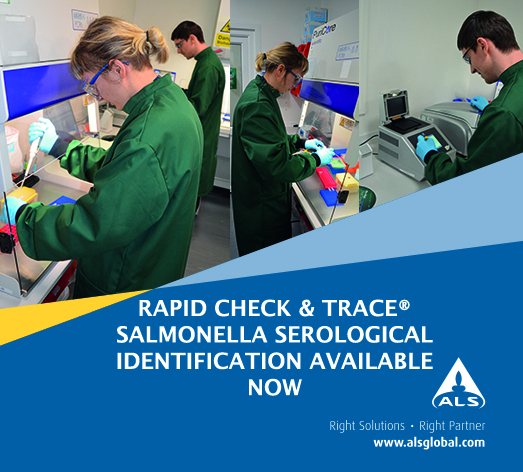Tuesday 10th December 2019
RAPID CHECK & TRACE® SALMONELLA SEROLOGICAL IDENTIFICATION NOW AVAILABLE AT ALS
Salmonella is one of the most common types of bacteria involved in food-borne outbreaks and a major area of concern for many of our clients in the food and beverage manufacturing industry. Despite technological advances, the control of outbreaks involving Salmonella remains a challenge and cases being identified are on the increase.
In most cases, the detection of a confirmed Salmonella spp alone is sufficient to demonstrate a potential food safety risk with a product. However, it can be beneficial to determine the specific type of Salmonella as this can sometimes aid investigations to determine the precise source of the contamination.
Traditionally this has been performed by a technique known as ‘serology’. This is where unique and distinct antigens (proteins on the surface of the bacteria) are mixed with specific antibodies (white blood cells). If they react with each other a specific reaction known as agglutination is observed. By reference to a table detailing all of the potential antigenic sequences (known as the Kauffman and White scheme), it is possible to determine the specific type of Salmonella which has been isolated.
The most common type of Salmonella in the UK is Salmonella enteritidis, followed by Salmonella typhimurium, so detections of these specific serotypes are often not much help in determining the specific origin or source of contamination of a product. However, sometimes a rare strain of Salmonella is isolated which makes the matching of different isolates easier and occasionally specific strains of Salmonella may have an association with a particular food-type or a specific geographical region. There is currently an outbreak in Europe caused by a very rare serotype (Salmonella mikawasima) which has affected almost 200 people in 5 different countries. The unique serological profile of this organism has made the investigation into finding a common source for the outbreak a lot easier.
The main drawback of traditional serological methods is the time that it takes to complete, as cultures need to be in an optimum condition to give the appropriate agglutination reaction. In addition, the cost of maintaining the vast array of antibodies required is very expensive.
At ALS, we have come up with a solution to both of these problems by investing in a new technology - Check and Trace® - which is able to identify the Salmonella isolates to the same degree of sensitivity, but by analysis of the genetic material of the bacteria rather than the antigenic structure of the organism. This gives an accurate and rapid identification of the particular type of Salmonella which can be incredibly useful when attempting to identify a potential cause of contamination of a product.
We are proud of the fact that ALS is the first contract laboratory in the UK to offer the Check and Trace® Salmonella Serotype Identification system which is carried out by our Specialist Microbiology Team based in Rotherham.
If your product sample has been identified as having a positive Salmonella result, we can arrange for a colony isolate to be taken from the retained slope and sent to Rotherham from whichever ALS laboratory carried out the original Salmonella test. The colony isolate does not need to be refrigerated and can therefore be transported via a specialist external courier. This will ensure that the Check & Trace® analysis can be progressed as quickly as possible.
This is a UKAS, AOAC-RI and OIE accredited rapid genetic test and is offered with a choice of turnaround times: either a standard turnaround of 5 days or a priority turnaround of <3 days.

If you would like to find out more about Salmonella testing or the NEW Check & Trace® method, please contact our Specialist Microbiology Team at Rotherham on [email protected] and they will be happy to help with your enquiry.